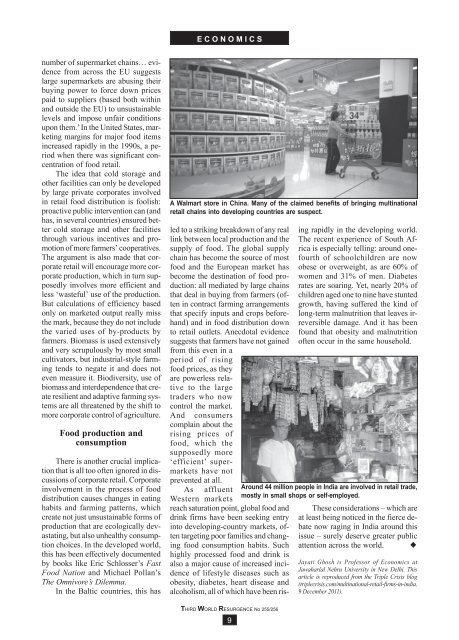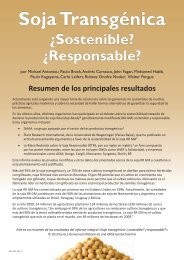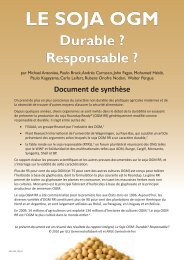E C O N O M I C Snumber of supermarket chains… evidencefrom across the EU suggestslarge supermarkets are abusing theirbuying power to force down pricespaid to suppliers (based both withinand outside the EU) to unsustainablelevels and impose unfair conditionsupon them.’ In the United States, marketingmargins for major food itemsincreased rapidly in the 1990s, a periodwhen there was significant concentrationof food retail.The idea that cold storage andother facilities can only be developedby large private corporates involvedin retail food distribution is foolish:proactive public intervention can (andhas, in several countries) ensured bettercold storage and other facilitiesthrough various incentives and promotionof more farmers’ cooperatives.The argument is also made that corporateretail will encourage more corporateproduction, which in turn supposedlyinvolves more efficient andless ‘wasteful’ use of the production.But calculations of efficiency basedonly on marketed output really missthe mark, because they do not includethe varied uses of by-products byfarmers. Biomass is used extensivelyand very scrupulously by most smallcultivators, but industrial-style farmingtends to negate it and does noteven measure it. Biodiversity, use ofbiomass and interdependence that createresilient and adaptive farming systemsare all threatened by the shift tomore corporate control of agriculture.Food production andconsumptionThere is another crucial implicationthat is all too often ignored in discussionsof corporate retail. Corporateinvolvement in the process of fooddistribution causes changes in eatinghabits and farming patterns, whichcreate not just unsustainable forms ofproduction that are ecologically devastating,but also unhealthy consumptionchoices. In the developed world,this has been effectively documentedby books like Eric Schlosser’s FastFood Nation and Michael Pollan’sThe Omnivore’s Dilemma.In the Baltic countries, this hasA Walmart store in China. Many of the claimed benefits of bringing multinationalretail chains into developing countries are suspect.led to a striking breakdown of any reallink between local production and thesupply of food. The global supplychain has become the source of mostfood and the European market hasbecome the destination of food production:all mediated by large chainsthat deal in buying from farmers (oftenin contract farming arrangementsthat specify inputs and crops beforehand)and in food distribution downto retail outlets. Anecdotal evidencesuggests that farmers have not gainedfrom this even in aperiod of risingfood prices, as theyare powerless relativeto the largetraders who nowcontrol the market.And consumerscomplain about therising prices offood, which thesupposedly more‘efficient’ supermarketshave notprevented at all.As affluentWestern marketsreach saturation point, global food anddrink firms have been seeking entryinto developing-country markets, oftentargeting poor families and changingfood consumption habits. Suchhighly processed food and drink isalso a major cause of increased incidenceof lifestyle diseases such asobesity, diabetes, heart disease andalcoholism, all of which have been risingrapidly in the developing world.The recent experience of South Africais especially telling: around onefourthof schoolchildren are nowobese or overweight, as are 60% ofwomen and 31% of men. Diabetesrates are soaring. Yet, nearly 20% ofchildren aged one to nine have stuntedgrowth, having suffered the kind oflong-term malnutrition that leaves irreversibledamage. And it has beenfound that obesity and malnutritionoften occur in the same household.Around 44 million people in India are involved in retail trade,mostly in small shops or self-employed.These considerations – which areat least being noticed in the fierce debatenow raging in India around thisissue – surely deserve greater publicattention across the world. ÿuJayati Ghosh is Professor of Economics atJawaharlal Nehru University in New Delhi. Thisarticle is reproduced from the Triple Crisis blog(triplecrisis.com/multinational-retail-firms-in-india,9 December 2011).THIRD WORLD RESURGENCE No 255/2569
Keeping markets happyIt’s not public-sector deficits that are at fault for the euro crisis – it’s the policies thathave enabled the financial sector to wield so much power.THE new fiscal pact agreed to by themajority of European Union (EU)countries (save Britain) on 9 Decemberin Brussels will do little to avoida pending catastrophe. It neither addressesthe main causes of the currenteurozone crisis nor calls for theeconomic policies urgently neededto restore stability and increase employmentand growth.The dominant discourse of thepact places the blame for the crisissquarely on public-sector profligacy,yet the crisis did not begin in thepublic sector. It began in the privatefinance sector, where it was triggeredby risky overleveraging by theunregulated shadow banking systemof non-bank financial institutions,many of which were exploiting adangerous housing bubble in theUnited States and Europe that wentneglected by authorities. It quicklybecame a public-sector deficit crisis,however, as lavish bank bailoutswere put together and tax revenuesfell because of the economic recession.Yet the initial problems of theunregulated nature of the financialsector and its reckless use of derivativesand commodity market speculation,not to mention the ‘too big tofail’ moral dilemma, have not been resolvedat all, leaving the door openfor the possibility of more financialcrises in the future.Another root cause of theeurozone crisis lies in the unwillingnessof the European Central Bank(ECB) to modify its current rules sothat it can act more like a proper centralbank. Although the ECB’s recentmoves to cut interest rates for the secondstraight month and expand emergencyfinancing for cash-starvedbanks are steps in the right direction,its continued unwillingness to buy thebonds of troubled eurozone countrieswill only deepen the crisis. True, thereis a technical ECB rule prohibitingunlimited bond purchases, yet oneE C O N O M I C SRick Rowdencc ArcCanThe European Central Bank building inFrankfurt, Germany. The ECB’s monetarypolicy is narrowly focused on maintaininglow inflation over other goals such aspromoting higher employment and growth.would think staring into the abyss ofa global depression might be a goodenough reason to break this rule.This fundamental failure to actwith bond purchases reflects theeurozone’s neoliberal architecture,which overtly seeks to diminish therole of the state and enhance thepower of the market. This thinking isalso reflected in the ECB’s monetarypolicy, which is narrowly focused onmaintaining low inflation over othergoals such as promoting higher employmentand growth. Becauseeurozone governments do not controltheir own national currencies and thuscannot devalue their way out of thecrisis, the only other option for increasingtheir export competitivenessis to drive wages down and furtherweaken labour rights, a process referredto as an ‘internal devaluation’through the adoption of ‘labour flexibility’reforms.In fact, the new EU plan to restrictdeficit spending to 3% of GDPand have EU countries cut and starvetheir way out of this recessionsmacks of the misguided fiscal andmonetary policy of 1937 and thesame anti-growth, anti-worker, andanti-public-investment toxic cocktailsthat have long characterised theInternational Monetary Fund(IMF)’s approach in developingcountries. These policies to drivewages lower and adopt budget austerityin the current context of a recessionwill surely fail as consumerdemand falls further, unemploymentworsens, tax receipts continue to decline,and public deficits rise anyway.Also at fault in the crisis is Germany’slongstanding beggar-thyneighbourapproach of using low inflationand low wages to out-competeits EU trading partners, whicheventually created destabilising imbalanceswithin the eurozone. Theapproach worked so well over thelast decade that it earned Germany amassive trade surplus while saddlingthe country’s less competitive EUpartners with large trade deficits. Inso doing, however, it wiped out thepurchasing power in these markets,which can no longer afford to buyGerman goods, thus killing the goosethat laid the golden eggs.So if these are the problems at theheart of the debt crisis, what are thesolutions? European leaders couldavoid eurozone imbalances in the firstplace by adopting sanctions againstboth deficit and surplus countries.Surplus countries could be requiredto provide countercyclical long-termfinancing to deficit countries duringcrises through a system of regionaltransfers, and adopt stimulus or evenmildly inflationary policies at hometo help boost the exports of deficitcountries. But such steps to avoidTHIRD WORLD RESURGENCE No 255/25610















